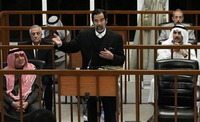Hussein's former defense minister is on trial
Former defense minister of Saddam Hussein denied receiving orders to use chemical weapons during a 1980s military crackdown against Kurds.

The comments by Sultan Hashim Ahmad al-Tai came as the defense began its closing statements in a trial of former regime officials accused of crimes against humanity. The other defendants in the so-called Anfal trial include Saddam's cousin, Ali Hassan al-Majid, also known as "Chemical Ali" for allegedly ordering poison gas attacks against the Kurds.
If convicted, the defendants could be sentenced to death by hanging.
Al-Tai, who was defense minister when Saddam was ousted by U.S.-led forces in 2003, was defiant as he testified that he had not received orders from his superiors to use chemical weapons against Kurdish population when he was the head of the Iraqi Army 1st Corps operating in the Kurdish region.
"I did not receive any order asking me to use chemical weapons, but if so I would have implemented it," he told the special tribunal. "I did not receive any chemical related weapons."
Chief Prosecutor Munqith al-Faroon said al-Tai had knowledge about the chemical attack, presenting a letter sent by his superiors asking him to use "special ammunition (chemical weapons) against enemy poison" ahead of an Iraqi army attack against Kurdish fighters.
Al-Tai and the other defendants face charges of war crimes and crimes against humanity arising from their roles in a military crackdown on Iraq's Kurdish population in 1987-88. The prosecution says 180,000 people, most civilians, were killed.
Besides, al-Majid, the other defendants are former director of military intelligence Sabir al-Douri; Hussein Rashid Mohammed, former deputy director of operations for the Iraqi Armed Forces; and Farhan Mutlaq Saleh, former head of military intelligence's eastern regional office.
Saddam was a defendant in the case but was hanged last year after his conviction for the killing of 148 Shiite Muslims in Dujail after a 1982 attempt on his life.
The defense also noted that the Americans had promised al-Tai "protection and good treatment" before his surrender.
Al-Tai, a Sunni Arab from the northern city of Mosul surrendered to U.S. forces in September 2003 after weeks of negotiations. At that time, a Kurdish official who arranged the surrender also said the American military had promised to remove Ahmad's name from the list of 55 most-wanted, meaning he would not face indefinite confinement and possible prosecution.
The lawyer said that his client was only defending his country against Iranian attacks in northern Iraq during the 1980-88 war between the two countries.
Subscribe to Pravda.Ru Telegram channel, Facebook, RSS!




